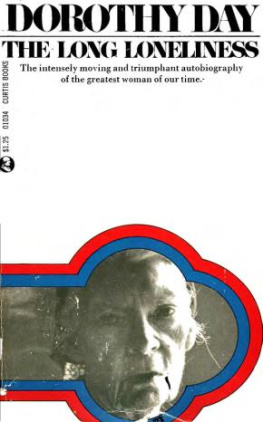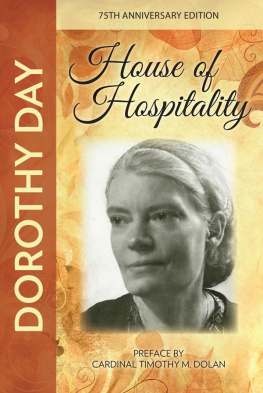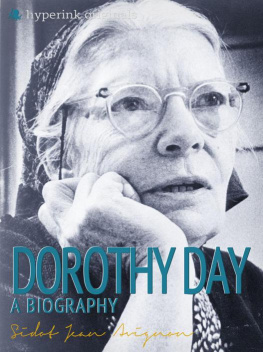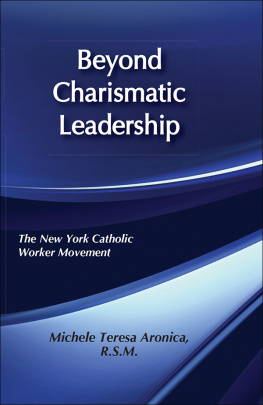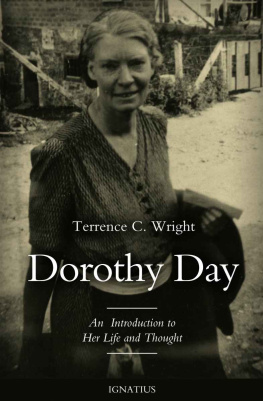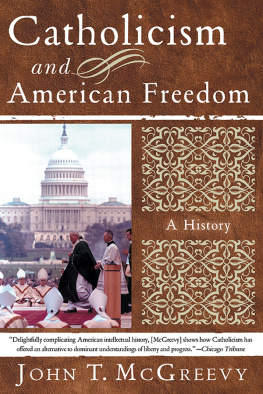AN UNFORGETTABLE STORY OF HUMAN LIBERATION
Womens lib. War resistance. Civil rights. Social justice. Sexual honesty. Communal living. Jesus Freaks. Today among us lives a woman who long has embodied all of this and more. She is Dorothy Day, considered by manywhatever their political or religious beliefs to be a saint.
The Long Loneliness is Dorothy Days own story of growing up free, of participating in the prime social and artistic movements of our time, of living with a man and raising a child out of wedlock, and of helping to found The Catholic Worker, which combines day-to-day religious faith with direct action to better the human condition on earth. A work of total candor and sublime beauty, it offers an indelible encounter with human greatness.

Curtis Books is also proud to publish Dorothy Days
LOAVES AND FISHES
ON PILGRIMAGE IN THE SIXTIES
THE
LONG
LONELINESS
The Autobiography of Dorothy Day
CURTIS
BOOKS
NEW YORK, N.Y.
Copyright, 1952, by Harper & Row Publishers, Inc.
Published by arrangement with Harper & Row Publishers, Inc.
Cover photograph by Jon Erikson
PRINTED IN THE UNITED STATES OF AMERICA
All Rights Reserved
CONTENTS
Part One SEARCHING
Part Two NATURAL HAPPINESS
Part Three LOVE IS THE MEASURE
I think, dear child, the trouble and the long loneliness you hear me speak of is not far from me, which whensoever it is, happy success will follow.... The pain is great, but very endurable, because He who lays on the burden also carries it.
Mary Ward, English Nun (1585-1645)
CONFESSION
When you go to confession on a Saturday night, you go into a warm, dimly lit vastness, with the smell of wax and incense in the air, the smell of burning candles, and if it is a hot summer night there is the sound of a great electric fan, and the noise of the streets coming in to emphasize the stillness. There is another sound too, besides that of the quiet movements of the people from pew to confession to altar rail; there is the sliding of the shutters of the little window between you and the priest in his box.
Some confessionals are large and roomyplenty of space for the knees, and breathing space in the thick darkness that seems to pulse with your own heart. In some poor churches, many of the ledges are narrow and worn, so your knees almost slip off the kneeling bench, and your feet protrude outside the curtain which shields you from the others who are waiting. Some churches have netting, or screens, between you and the priest and you can see the outline of his face inclined toward you, quiet, impersonal, patient. Some have a piece of material covering the screen, so you can see nothing. Some priests leave their lights on in their boxes so they can read their breviaries between confessions. The light does not bother you if that piece of material is there so you cannot see or be seen, but if it is only a grating so that he can see your face, it is embarrassing and you do not go back to that priest again.
Going to confession is hardhard when you have sins to confess, hard when you havent, and you rack your brain for even the beginnings of sins against charity, chastity, sins of detraction, sloth or gluttony. You do not want to make too much of your constant imperfections and venial sins, but you want to drag them out to the light of day as the first step in getting rid of them. The just man falls seven times daily.
Bless me, Father, for I have sinned, is the way you begin. I made my last confession a week ago, and since then ...
Properly, one should say the Confiteor, but the priest has no time for that, what with the long lines of penitents on a Saturday night, so you are supposed to say it outside the confessional as you kneel in a pew, or as you stand in line with others.
I have sinned. These are my sins. That is all you are supposed to tell; not the sins of others, or your own virtues, but only your ugly, gray, drab, monotonous sins.
When one writes the story of his life and the work he has been engaged in, it is a confession too, in a way. When I wrote the story of my conversion twelve years ago, I left out all my sins but told of all the things which had brought me to God, all the beautiful things, all the remembrances of God that had haunted me, pursued me over the years so that when my daughter was born, in grateful joy I turned to God and became a Catholic. I could worship, adore, praise and thank Him in the company of others. It is difficult to do that without a ritual, without a body with which to love and move, love and praise. I found faith. I became a member of the Mystical Body of Christ.
Going to confession is hard. Writing a book is hard, because you are giving yourself away. But if you love, you want to give yourself. You write as you are impelled to write, about man and his problems, his relation to God and his fellows. You write about yourself because in the long run all mans problems are the same, his human needs of sustenance and love. What is man that Thou art mindful of him? the Psalmist asks, and he indicates mans immense dignity when he says, Thou hast made him a little less than the angels. He is made in the image and likeness of God, he is a temple of the Holy Spirit. He is of tremendous importance. What is man, where is he going, what is his destiny? It is a mystery. We are sons of God, and it is a terrible thing to fall into the hands of the living God.
I can write only of myself, what I know of myself, and I pray with St. Augustine, Lord, that I may know myself, in order to know Thee. I could write long chapters about my daughter, about my early associates, about the men and women I have been working with these last eighteen years. Probably I have been unfair not to have written more about them, but if I started to tell about all the saints and sinners among us and the fascinating account of their lives, I would never end. Moreover, I feel hesitant to go too deeply in writing of other lives. It is hard enough to write about my own. I do feel, however, that I have a right to give an account of myself, a reason for the faith that is in me. But I have not that right to discuss others. Just the same, if I have slighted anyone, if I have failed to give credit where credit is due, if I have neglected some aspects of the work in stressing others, I beg pardon of my readers. I am a journalist, not a biographer, not a book writer. The sustained effort of writing, of putting pen to paper so many hours a day when there are human beings around who need me, when there is sickness, and hunger, and sorrow, is a harrowingly painful job. I feel that I have done nothing well. But I have done what I could.
I have not always felt the richness of life, its sacredness. I do not see how people can, without a religious faith. Children have a sense of joy in life but that soon wears away. One hears adolescents say, I did not ask to be born. Rebellion has started.
My life has been divided into two parts. The first twenty-five years were floundering, years of joy and sorrow, it is true, but certainly with a sense of that insecurity one hears so much about these days. I did not know in what I believed, though I tried to serve a cause. Five years after I became a Catholic I met Peter Maurin and his story must play a great part in this work because he was my master and I was his disciple; he gave me a way of life and instruction, and to explain what has come to be known as The Catholic Worker Movement in the Church throughout the world, I must write of him.
But I will begin with my own story. All my life I have been haunted by God, as Kiriloff said in The Possessed. This must indeed be so, as former friends and comrades have said this of me. Not long ago when I was visiting a patient at Bellevue, I again met someone whom I had known casually at the University of Illinois and in Chicago in the early days of the Communist party there. I remember you, she said, because Fred Ellis mother-in-law did a painting of you which they still have. Fred is a Daily Worker cartoonist. The last time I saw you, years ago, you were talking to me of God.
Next page
